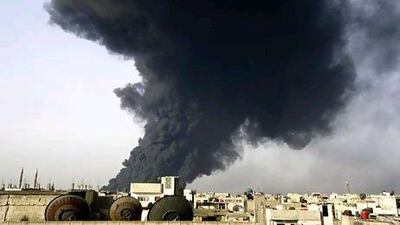You can't make war in the Middle East without Egypt, and you can't make peace without Syria, observed the former United States secretary of state Henry Kissinger. With key members of the regime assassinated, fighting in the streets of Damascus and border crossings in the hands of the opposition, president Bashar Al Assad's days seem to be numbered.
Not a major oil producer itself, Syria's fate still has implications for this energy-rich region. The country's importance has always been as an oil transit state rather than a producer.
During the Iran-Iraq War, to support its ally Tehran, Syria closed the Iraqi pipeline that runs to the Mediterranean.
Last July, with the uprising already well under way, Iran, Iraq and Syria signed a deal for a US$10 billion (Dh36.73bn) gas pipeline. Some observers, who should have been more familiar with Tehran's history of grandiose unrealised energy projects, took this as motivation for a western campaign against the Al Assad regime. A large part of Syria's own oil is in the largely Kurdish north-east corner, sandwiched between Iraq and Turkey (most of the rest lies farther south, along the Euphrates).
Before the uprising against Mr Al Assad, Syria's oil brought in $4bn a year, a third of the government budget. Any new government will need this money.
The mountainous heartland of Mr Al Assad's Alawi sect, from which he may seek to continue the fight, commands the pipeline routes to the Mediterranean ports of Baniyas, Latakia and Tartus. Syria's offshore potential is indicated by the large Cypriot and Israeli gas discoveries nearby, but cannot be explored soon enough to make a separate Alawi entity economically viable.
If an independent state is out of reach, guerrilla warfare and pipeline sabotage may not be.
A prolonged civil war would threaten the spillover of violence into Iraq, which has already suffered a recent upsurge in bombings.
Though this would probably not affect the major oil projects around Basra, it would further undermine Baghdad's ability to translate petroleum revenues into a better life for its people.
Iran, its ally in Damascus overthrown, would be likely to redouble its efforts to exert influence in Iraq, with the GCC states apparently unable to offer a tempting alternative.
Yet even a victorious revolutionary Syrian government may be far from friendly to Iraq, on sectarian grounds and from its friendliness to Iran and to Mr Al Assad.
Already there have been reports of Iraqis in Syria being attacked as they sought to return home; Iraq has closed its borders to Syrian refugees, perhaps fearing infiltration by violent extremists. Mutual hostility would condemn Iraq's shortest westward-bound pipeline route.
As one route closes, another may open. Kurdish forces are said to be ready to enter Qamishli, the largest city in Syrian Kurdistan.
They supposedly include 650 defectors from the Syrian army who were trained in Erbil by the forces of Massoud Barzani, the president of Iraq's Kurdistan Regional Government (KRG).
About 9 per cent of Syrians are Kurdish, 1.6 million people. If they emerge as a major force in a post-Al Assad Syria, they offer an alternative route for KRG oil exports, dependent on agreement neither with Baghdad nor with Ankara.
Alternatively, the KRG can demonstrate its usefulness to Ankara by moderating Syrian Kurdish parties linked to the Kurdistan Workers Party (PKK), which has carried out a long insurgency. Just on Friday, the PKK was accused of blowing up the Iraq-Turkey oil pipeline.
Beyond these specifics, Syria, though not itself an important oil producer, is as Mr Kissinger noted a pivotal state for the world's premier energy region.
The denouement of its revolution, and the nature of the government that comes afterwards, will be a powerful example for the Middle East, whether for chaos or renewal.
Robin Mills is the head of consulting at Manaar Energy, and the author of The Myth of the Oil Crisis and Capturing Carbon
twitter: Follow and share our breaking business news. Follow us
iPad users can read the digital edition of business section as it was printed via our e-reader app. Click here


